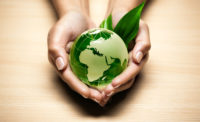Henkel Publishes Sustainability Report
.jpg?1678966269)
Henkel published its 32nd Sustainability Report, outlining its performance and progress on implementing its sustainability strategy and targets. In a highly challenging market environment, the company was able, among other things, to drive progress in sustainability in many key dimensions, in particular by further reducing its CO2-emissions and expanding its social engagement.
“In 2022, we took a significant step toward our goal of achieving a climate-positive production by 2030 by further expanding our use of renewable energy,” said Sylvie Nicol, member of the Henkel Management Board, responsible for Human Resources and Sustainability. “We were also able to make further progress on gender parity. The percentage of women in management positions increased to 38.7% in 2022. We are fully committed to further accelerating and stepping up our efforts with concrete programs and actions to leverage the full potential of our diversity.”
Last year, Henkel published its 2030+ Sustainability Ambition Framework, in which the company defined new and additional ambitions, taking global developments into account. In particular, Henkel made progress on climate protection in 2022, reducing its CO2-emissions in production by 55% per metric ton of product (compared to the base year 2010). Henkel has increased the proportion of electricity purchased from renewable sources to 70%. By 2030, Henkel aims to achieve a climate-positive carbon footprint for its worldwide production and source 100% of the electricity for production sites from renewable sources.
By 2025, 100% of packaging will be designed for recycling and reuse. In 2022, the proportion increased to around 87%. Henkel also aims to increase the share of recycled plastic content in its consumer goods packaging. In 2022, this share was around 16%. By 2025, Henkel also aims to reduce its waste volume by 50% per ton of product compared to 2010. In 2022, the company already recorded a reduction of 43%. By 2030, Henkel aims to achieve circular use of its production waste material.
Henkel also made progress in the protection of natural resources last year. As part of its supplier management, the company works with selected strategic suppliers to ensure the procurement of sustainable raw materials. In 2022, for example, Henkel was able to increase the traceability rate for palm-based raw materials back to the mill from 84% to 89% compared to the previous year. Last year, Henkel entered into a multi-year cooperation agreement with BASF. With the aid of the so-called biomass balance approach, fossil raw materials are to be replaced with renewable raw materials for up to 110,000 metric tons of ingredients per year.
For more information, visit: https://www.henkel-northamerica.com/.
Looking for a reprint of this article?
From high-res PDFs to custom plaques, order your copy today!





